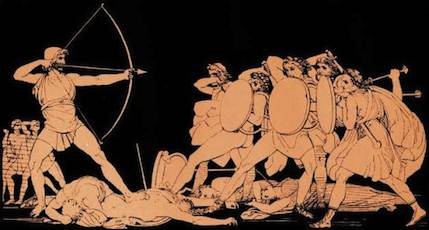Ten years getting home. Shipwrecks, monsters, sorceresses and demigods: transformations, disguises, and finally a triumphant return: The Odyssey, even more than the story of the Argonauts, is the epic of the journey.
If fantasy is a genre of quests, science fiction is one of journeys. Leaving aside science fiction literature for the time being, I can think of no fewer than four SF television shows from the last decade or so in which the voyage with no visible end forms the central theme. Star Trek: Voyager stands, chronologically speaking, in first place, followed by Farscape, Battlestar: Galactica, and most recently the fated-to-be-short-lived Stargate: Universe. One can debate whether or not these shows owe as much to the legend of the Flying Dutchman as to The Odyssey. Certainly the military-political concerns of BSG and the ensemble nature of ST:V and SG:U make it difficult to draw meaningful parallels with wily Odysseus, but that doesn’t mean they aren’t there.
Voyager, especially, with the handwaving nature of its science!magic, brings Homer’s witches powerfully to mind. Tom Paris’ bodyswapping episode, “Vis a Vis,” puts me strongly in mind of the transformative nature of Circe’s magic in The Odyssey, and Voyager’s constant search for information, particularly concerning the way home reminds me of Telemachos going forth to seek for his long-lost father’s whereabouts, proof of life or demise. (I’m even willing to call these concerns thematically equivalent—which quite possibly makes me weirder than the average run of geek—but I suspect that’s a thorny argument to make.)
But it’s Farscape, weird and wacky, ever-ready to crank up the tension or the craziness or both at once, that really gives us the SF paradigm of a modern Odysseus in the figure of John Crichton. An astronaut shot through a wormhole to the far side of the galaxy, stranded among strangers—most of whom want to kill him—he survives thanks to his wits and not a little luck.
Admittedly, Crichton is rather less ruthless than his epic predecessor, at least initially. But it is cunning—in the sense of native wit and cleverness—that unites John Crichton and Odysseus. (The Trojan horse was the Ithakan’s idea. That’s cunning.) Cunning and the fact that Crichton, like quick-tongued Odysseus, is extraordinarily adept into talking people into doing things they would really rather not.
Several episodes from first and second season Farscape resonate very strongly with incidents within The Odyssey, as do a couple which I want to talk about from the fourth. If a spoiler warning is necessary for a show that’s been off the airwaves for several years, you are hereby warned. Farscape spoilers will follow.
[Spoiler space]
Still here? Excellent.
Magic—or, at least, sufficiently advanced technology—is far from unknown in Farscape. Crichton encounters sorcerous beings more than once. Malthus, whose enmity is rather like Circe’s, but without the gendered opposition, separates Crichton from the rest of Moya’s crew in order to get him killed quite dead; the Delvians, Zhaan’s species, whose mental powers may as well be sorcery; Stark, whose mental powers are accompanied by a fresh new strain of crazy.
Alongside sorcery, there are more technological transformations: the infamous and inimitable iterated triple body-swap episode. The episode “DNA Mad Scientist” where the eponymous mad scientist, at first merely mercenary, is revealed to have more dubious aims and whose attempt to transform Aeryn Sun into a Pilot hybrid is foiled by Crichton’s stubbornness.
If these recollect the sorcerous interludes of The Odyssey, “Thank God It’s Friday, Again” recollects the Lotophagoi. The entire planet’s population is hooked on the drug they cultivate, although unlike the Lotus Eaters of myth, more sinister forces are at work in the background. And “Jeremiah Crichton,” in which John is stranded on a paradise planet with the opportunity to woo one of the local beauties almost recollects Calypso. (In The Odyssey, Odysseus gets to depart Calypso’s island because of the intervention of the gods. In Crichton’s case, the god involved is Dominar Rygel XVI of Hyneria, and the departure process is altogether less smooth.)
I was going to attempt to compare the Scarrans to the Cyclopes… but no. The Scarrans are downright scary. The Cyclopes are merely somewhat barbarous, tragic, easily-fooled cannibalistic monsters.
I will admit, Farscape is several orders of magnitude weirder than The Odyssey. I mean this in the best possible sense. Nowhere is this more apparent than in the three-episode arc (“Unrealised Reality,” “Kansas,” and “Terra Firma”) in season four which concerns Crichton’s return to Earth. Odysseus, though he returned in disguise to Ithaka, didn’t have the excuse of needing to avoid screwing too much with the space-time continuum. And when Crichton returns to Earth the first time, courtesy of another wormhole, he arrives twenty years before he left.*
*And “Kansas” has some of the funniest moments I have ever seen on a screen. Also, a witch.
(Fortunately, there are no Penelopes here, weaving and unpicking their threads for twenty years. Not only would that be extra space-time-continuum-stretching weirdness, but Penelope’s virtues are a little too passive for my tastes. Though YMMV.)
If I were to start on the influence of The Odyssey in literature, we might be here for another thousand words or more. Particularly if you step sideways into fantasy. Or include lengthy journeys that don’t, necessarily, take place on vessels. So I’ll just close with a question instead. Probably the obvious question.
What do you think?
[Read the other posts in the SFF and the Classical Past series.]
Liz Bourke is reading for a research degree in Classics at Trinity College, Dublin. A longtime SFF fan, she also reviews for Ideomancer.com.










